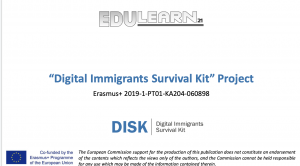The project DISK was presented at the 13th annual EDULEARN21 International Conference on education and new learning technologies.EDULEARN21 was held virtually on July 5 and 6, 2021.
![]()
A selection of keynote speeches and workshops were delivered online by world-leading inspirational speakers and trainers. There were many prominent keynotes as below:

In addition to the live activities, participants had access to the website Technical Program, which contains presentations, posters, and videos organized by topic and available on-demand during and after the conference. EDULEARN21 Proceedings will be produced with all the accepted abstracts and papers.
Our presentation was given online. All partners in the DISK project were the authors: E. Ossiannilsson, QOOL Ossiannilsson Quality in Open Online Learning Consultancy, Sweden; P. Ferreira, University of Porto, Portugal, co-ordinator; A. Soeiro, University of Porto, Portugal; P. Mazohl, EFQBL – European Foundation for Quality in Blended Learning, Austria; K. De Angelis, Training 2000, Italy; M. Filioglou, EDRASE – Educational Activities Society, Greece; N. Tzimopoulos; EDRASE – Educational Activities Society, Greece. See the presentation here

The DISK project aims to develop missing digital competencies of adults (Adult Education AE with a special focus on so-called ”digital immigrants” which are people disadvantaged in society due to their lack of digital competencies DC and therefore count to minor educated people in DC) and to enable them to take an active role in the digital society.
The objectives are to create, implement and evaluate 15 modules teaching various specific topics related to everyday life covering DCs as a “Digital Immigrants Survival Kit” (DISK), to use flipped learning 3.0 as the training approach, to create an innovative self-evaluation tool based on competency-based self-evaluation mandalas, to create a transferability and implementation guide, to transfer the results and outcomes in a flexible way in other European countries and finally to publish the modules of the DISK Toolkit as Open Educational Resources (OER). List of results during the project’s lifetime – these are the elements that lead to the Digital Immigrants Survival kit (toolkit, course modules)
- Competence Map (fitting to the described modules of the Toolkit)
- Developed training content
- Training path and pilot testing
- OERs
- Transferability and implementation guide
